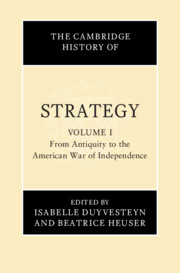Book contents
- The Cambridge History of Strategy
- The Cambridge History of Strategy
- The Cambridge History of Strategy
- Copyright page
- Dedication
- Contents
- Maps
- Contributors to Volume I
- Preface and Acknowledgements
- Introduction to Volume I
- 1 China to ad 180
- 2 Teispid and Achaemenid Persia (c. 550–330 bc)
- 3 Ancient Greece
- 4 Philip II, Alexander III and the Macedonian Empire
- 5 Ancient Rome: Monarchy and Republic (753–27 bc)
- 6 China ad 180–1127
- 7 Ancient Rome
- 8 The Gupta Empire (ad 400–500)
- 9 The Sassanian Empire’s Strategies
- 10 The Rashidun, Umayyad (661–750) and Abbasid (750–1258) Caliphates
- 11 Byzantine Strategy (ad 630–1204)
- 12 Strategies in the Wars of Western Europe, 476–c. 1000
- 13 Latin Christendom in the Later Middle Ages
- 14 Chinggis Khan and the Mongol Empire, ad 1206 to 1368
- 15 Hindu and Buddhist Polities of Premodern/Early Modern Mainland South-East Asia (1100–1800)
- 16 Pre-Columbian and Early Historic Native American Warfare
- 17 Ottoman Expansionism, 1300–1823
- 18 Strategy in the Wars of Pre-colonial Sub-Saharan Africa
- 19 Strategies of the Mughal Empire
- 20 China, 1368–1911
- 21 Early Modern Europe: The Habsburgs and Their Enemies, 1519–1659
- 22 Naval Strategies
- 23 The Strategy of Louis XIV
- 24 Hohenzollern Strategy under Frederick II
- 25 American Warfare in the Eighteenth Century
- Summary of Volume I
- Further Reading
- Index
7 - Ancient Rome
Principate and Dominate (27 bc–ad 630)
Published online by Cambridge University Press: 06 January 2025
- The Cambridge History of Strategy
- The Cambridge History of Strategy
- The Cambridge History of Strategy
- Copyright page
- Dedication
- Contents
- Maps
- Contributors to Volume I
- Preface and Acknowledgements
- Introduction to Volume I
- 1 China to ad 180
- 2 Teispid and Achaemenid Persia (c. 550–330 bc)
- 3 Ancient Greece
- 4 Philip II, Alexander III and the Macedonian Empire
- 5 Ancient Rome: Monarchy and Republic (753–27 bc)
- 6 China ad 180–1127
- 7 Ancient Rome
- 8 The Gupta Empire (ad 400–500)
- 9 The Sassanian Empire’s Strategies
- 10 The Rashidun, Umayyad (661–750) and Abbasid (750–1258) Caliphates
- 11 Byzantine Strategy (ad 630–1204)
- 12 Strategies in the Wars of Western Europe, 476–c. 1000
- 13 Latin Christendom in the Later Middle Ages
- 14 Chinggis Khan and the Mongol Empire, ad 1206 to 1368
- 15 Hindu and Buddhist Polities of Premodern/Early Modern Mainland South-East Asia (1100–1800)
- 16 Pre-Columbian and Early Historic Native American Warfare
- 17 Ottoman Expansionism, 1300–1823
- 18 Strategy in the Wars of Pre-colonial Sub-Saharan Africa
- 19 Strategies of the Mughal Empire
- 20 China, 1368–1911
- 21 Early Modern Europe: The Habsburgs and Their Enemies, 1519–1659
- 22 Naval Strategies
- 23 The Strategy of Louis XIV
- 24 Hohenzollern Strategy under Frederick II
- 25 American Warfare in the Eighteenth Century
- Summary of Volume I
- Further Reading
- Index
Summary
Evidence for discussing grand strategy in the Roman Empire is extremely limited. In reaction to Luttwak’s thought-provoking book, ancient historians have tended to focus on limitations in the information available to emperors and hence their capacity to determine priorities. Kagan’s reformulation of Luttwak’s thesis to use troop movements as a proxy for strategic decision making does not adequately take into account the personal and cultural considerations that often influenced rulers, and in particular that suppression of internal rivals took priority over external threats. That said, grand strategy remains a useful tool for investigating imperial decision making, especially for emperors such as Augustus and Diocletian, both of whom had to stabilize the empire after protracted bouts of civil war and enjoyed long reigns. It is also relevant to the later empire (after AD 300) when rulers regularly had to balance threats and opportunities on different frontiers against the more limited resources that were available.
- Type
- Chapter
- Information
- The Cambridge History of Strategy , pp. 144 - 170Publisher: Cambridge University PressPrint publication year: 2025

